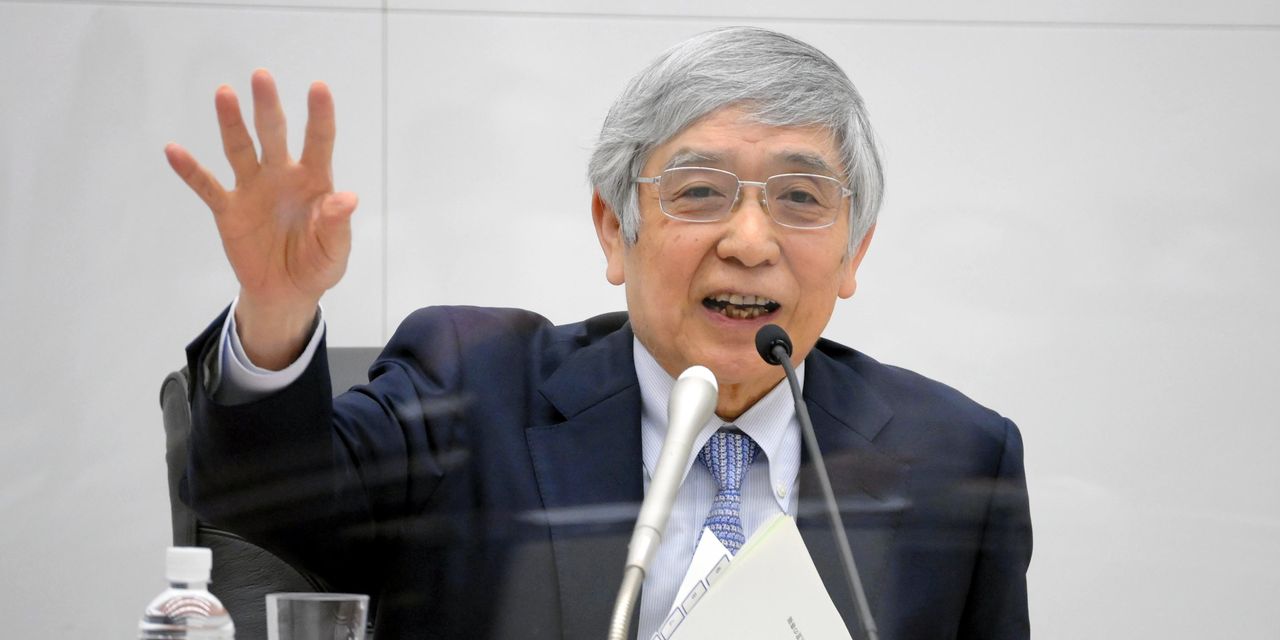
TOKYO—Japan’s central bank kept its monetary policy ultraloose and expressed minimal concern about inflation, joining continental Europe in showing that recent tightening in the U.S. doesn’t necessarily represent a global phenomenon.
The Bank of Japan on Friday maintained its target for short-term interest rates at minus 0.1% and said it would continue guiding the yield on 10-year Japanese government bonds to around zero, well below the U.S. where equivalent government bonds are yielding more than 1.4%.
Japanese consumers have seen little of the price pressures hitting Americans, with overall consumer prices rising just 0.1% in October compared with the same month a year earlier. Prices actually fell if the volatile categories of energy and fresh food were excluded.
“Although prices may not fall all the time, and there may be some upside risks, there is little possibility that inflation will reach at or above 2% [in Japan] as in the U.S. and Europe,” Bank of Japan Gov. Haruhiko Kuroda said at a news conference on Friday. “I don’t think the BOJ will move toward normalizing monetary policy.”
Mr. Kuroda’s stance resembles that of European Central Bank President Christine Lagarde, who said Thursday she didn’t expect to raise interest rates in 2022. The ECB also kept its bond-buying program open-ended, surprising some analysts, although it did call for bond purchases to be scaled back next year.
In the U.S., inflation hit a 39-year high in November, and Federal Reserve officials this week penciled in at least three quarter-percentage-point rate increases next year.
On Thursday, the Bank of England became the first major central bank to raise its policy rate since the pandemic began. Prices in the U.K. rose 5.1% in November over a year earlier, the biggest annual jump in a decade.
The U.S. and U.K. situation isn’t shared in many other parts of the world including Asia. In Japan, demand for goods such as cars is relatively tame and wages are rising only slowly, so companies fear they will get punished if they try to pass on higher costs to consumers.
“Experience tells us [higher prices] would reduce sales as consumers shift to other products and spend less,” said Naomi Muguruma, an economist at Mitsubishi UFJ Morgan Stanley Securities. “Unless income conditions improve to the level at which consumers can catch up with price increases and continue to spend, consumer prices are unlikely to rise,” she said.
Still, some companies say they can no longer afford to bear the burden of higher costs themselves. Corporate goods prices in Japan hit a 41-year high in November, rising 9% from a year earlier. In late October, restaurant operator Yoshinoya Holdings Co. raised the price of its signature beef bowl by the equivalent of 34 cents, citing higher prices for imported beef and energy.
Hoping to produce a virtuous cycle of higher income and consumer spending, Prime Minister Fumio Kishida has promised to increase tax incentives for companies that raise wages. He is also stepping up government spending with a stimulus package valued at the equivalent of $490 billion. Parliament is set to pass an extra budget supporting the stimulus this month.
The Bank of Japan already owns about half of the government’s outstanding bonds and has committed to buy as many as needed to keep the rate on the benchmark 10-year bond around zero. The central bank’s support “will increasingly become indispensable for the government to keep a free hand in fiscal policy,” said Shigeto Nagai, an economist at Oxford Economics and a former BOJ official.
While it kept its zero-interest-rate policy, the Bank of Japan did scale back one program introduced in the early days of the pandemic in 2020. At the time, the BOJ said it would lift holdings of commercial paper and corporate bonds to ¥20 trillion, equivalent to $176 billion, ensuring big companies would have access to short-term cash.
Recently, “issuance conditions have been extremely favorable,” said BOJ Deputy Gov. Masayoshi Amamiya this month, so the BOJ said it would dial back its holdings of the corporate credit assets to the pre-pandemic total of about ¥5 trillion.
Write to Megumi Fujikawa at [email protected]
Copyright ©2021 Dow Jones & Company, Inc. All Rights Reserved. 87990cbe856818d5eddac44c7b1cdeb8








